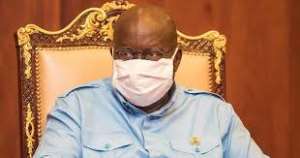
The warfare between the world's medical system and its mortal enemy; Covid-19 has been a fierce one. This is because the tactics employed by the latter is an invisible and unprecedented attack on humanity. While the medical system is still trying to discover a vaccine for cure or a protection against the novel pandemic, it’s incumbent on every individually to protect themselves from falling a victim to the virus and to prevent its wild spread.
Though this measure is intended to provide a positive effect in the society, it has also given rise to a negative energy called stigmatization. Social stigma has been one of the major challenges in the covid battle in Ghana. There has been an astronomical increase in Ghana’s cases as the months go by and just as the number of confirmed cases increase, the number of people who ' miraculously' got healed also increased.
Ordinarily, one could infer that the recoveries would bring joy and hope back to society nonetheless it has rather caused discrimination among individuals as some are pointing fingers at recovered covid victims. Stigmatization in Ghana is based on geographical location that is people who live in areas considered as hotspot zones are subjected to social stigma. There was an instance where a driver denied a passenger from boarding his car, just because he heard the passenger lives at Obuasi, which is one of the hotspots in Ghana.
Others who are vulnerable to stigma are victims who recovered from the virus. A 9-months pregnant woman from the upper East of Ghana recounted her story of how she has been treated by her fellow market women and neighbors. She was denied the right to sell at where she used to. Apart from the victims themselves, the families of such are also being stigmatized. She again recounted her daughter has been pelted with stone by kids. Many more of such cases are recorded in various news outlets.
Another group of people who are suffering social stigma are the returnees from abroad. Some people perceive those from abroad as conduit by which the virus entered Ghana through people who came into the country. There was a case where both the family, friends and neighbors of a returnee run away from him even after having observed the two weeks mandatory quarantine of which he was later declared free from the virus. Many ill treatments are being melted out to these victims. Some are being envicted from their houses by their landlords and landladies, rendering them homeless. Others are refused services like haircut among other services. Others are denied buying and selling.
These victims are left with nothing but emotional trauma and psychological effects. So the questions, why do people stigmatized others who fell victims with no fault of theirs? Could it be the uncertainty of the unknown? While these questions remain mind boggling, what are the measures to curb this insolent behavior of such people?
The authorities must take action to either punish or fine people who publicly stigmatize others, especially in this covid era. Aside the trauma it poses on the victims, it would aggravate the spread of the covid as people would hide from seeking medical attention early, thereby spreading it more. It would again make the work of the health workers and the contact tracers difficult as people would not compromise. It could also lead to lose of lives through the virus and or even after recovery, as people would not report the cases early for treatment and someone may commit suicide.
Government should put measures in place for psychological intervention, where recoverers would be psychologically prepared before returning to their places of residence. This will help them to handle any form of stigma to be encountered. Fellow Ghanaians let's unite and fight against this unknown enemy. The enemy is not one another, the enemy is the virus.
Vivian Akos Larbi
Gideon Asante




 Meta releases new version of conversational AI across its platforms
Meta releases new version of conversational AI across its platforms
 Cape Town named Africa’s Best Airport 2024 by Skytrax
Cape Town named Africa’s Best Airport 2024 by Skytrax
 Bono East: Four injured after hearse transporting corpse crashes into a truck
Bono East: Four injured after hearse transporting corpse crashes into a truck
 ‘Be courageous, find your voice to defend our democracy’ — Sam Jonah urges journ...
‘Be courageous, find your voice to defend our democracy’ — Sam Jonah urges journ...
 Exodus of doctors, nurses and teachers have worsened because of unserious Akufo-...
Exodus of doctors, nurses and teachers have worsened because of unserious Akufo-...
 2024 election: Avoid insults, cutting down people in search of power – National ...
2024 election: Avoid insults, cutting down people in search of power – National ...
 ‘You passed through the back door but congratulations’ — Atubiga on Prof Jane Na...
‘You passed through the back door but congratulations’ — Atubiga on Prof Jane Na...
 Government’s $21.1 billion added to the stock of public debt has been spent judi...
Government’s $21.1 billion added to the stock of public debt has been spent judi...
 Akufo-Addo will soon relocate Mahama’s Ridge Hospital to Kumasi for recommission...
Akufo-Addo will soon relocate Mahama’s Ridge Hospital to Kumasi for recommission...
 We must not compromise on our defence of national interest; this is the time to ...
We must not compromise on our defence of national interest; this is the time to ...
